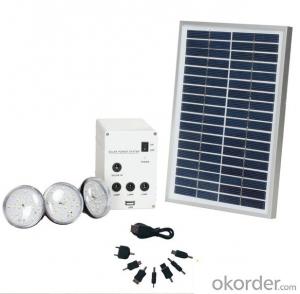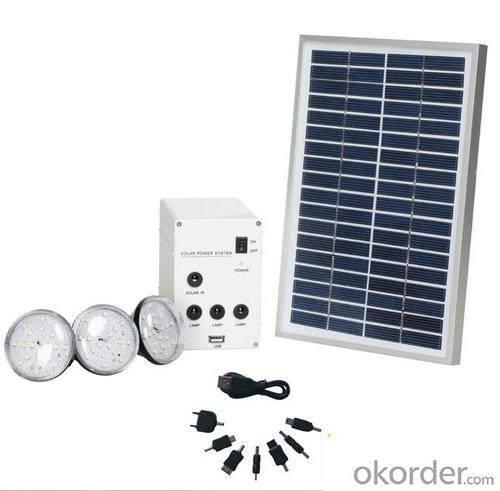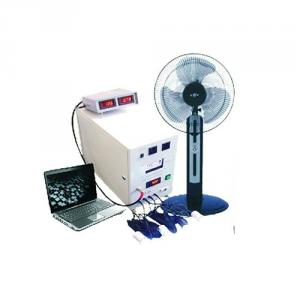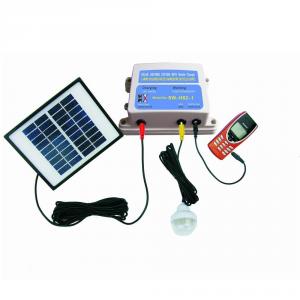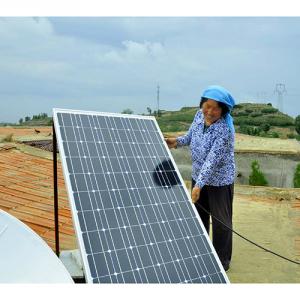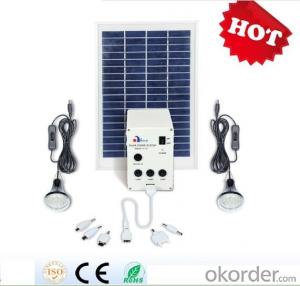Mini Home Solar System with LED Bulbs and Mobile Charger 2W 3W 5W 10W 20W 50W 100W
- Loading Port:
- Shanghai
- Payment Terms:
- TT or LC
- Min Order Qty:
- 2 watt
- Supply Capability:
- 100000 watt/month
OKorder Service Pledge
OKorder Financial Service
You Might Also Like
| Quick Details | |||||
| Specification: | Normal | Application: | Home | Output Voltage (V): | 12V |
| Load Power (W): | 24W | Solar Power (W): | 5W | Work Time (h): | 8月10日 |
| Max. voltage of solar panel to bear: | 24V | Max. conversion efficiency: | 0.8 | Max. output power: | 24W |
| Max. discharging current: | 2A | Max. charging current: | 2A | Output voltage: | 12V |
| Input voltage: | 12V | Usage: | indoor, home use,solar power system, solar home lighting system | ||
| Packaging & Delivery | |||||
| Packaging Detail: | Quantity of carton :3pcs Color Box size: 28.5*11.5*487.5px , 2.66kg/pc Carton size: 36.5*31*575px G.W/N.W: 8.7/8.0 kg | ||||
| Delivery Detail: | 25 working days according to order quantity |
| Specifications |
| 1. mini home solar system |
| 2. solar panel:18V,5W |
| 3. LED: DC12V,20LED,1W |
| 4. battery:Lead acid ,12V,4Ah |
| 5. time: 8-10Hours |
Usage:
Mini solar home lighting system, for indoor and home lighting usage.
| Specifications |
| 1. mini home solar system |
| 2. solar panel:18V,5W |
| 3. LED: DC12V,20LED,1W |
| 4. battery:Lead acid ,12V,4Ah |
| 5. time: 8-10Hours |
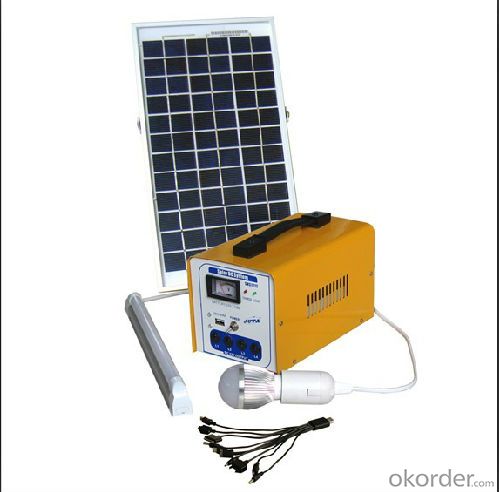
| Advantages: |
| 1.Solar Energy&green energy. |
| 2. Easy to install, operate and maintain. |
| 3. Ideal lighting products where normal electric is not convenient. |
| Packing details: |
| Quantity of carton :3pcs |
| Color Box size: 28.5*11.5*487.5px , |
| 2.66kg/pc |
| Carton size: 36.5*31*575px |
| G.W/N.W: 8.7/8.0 kg |
Our services:
1. Sample: Sample is available. Please send us email about your detail consignee information: name, address, zip code and tel. Then we will contact you and send samples to you.
2. Small order: We can accept small order for this product. Please let us know your order quantity.
3. Customize: We accept OEM service and can customize products as customers' design.
4. After-sales service: We will give customers active feedback within 24hours after receive any of customers' questions.
FAQ
We have organized several common questions for our clients,may help you sincerely:
①what price for each watt?
it depends on the quantity, delivery date and payment terms,
②what is your size for each module? can you tell me the parameter of your module?
we have different series of panels in different output, both c-si and a-si. please take the specification sheet for your reference.
③Can you provide the peripheral products of the solar panels, such as the battery, controller, and inverter? If so, can you tell me how do they match each other?
Yes, we can, we have two companies for solar region, one is CNBM International, the other is CNBM engineering Co.
We can provide you not only the solar module but also Solar Cells, the off grid solar system, we can also provide you service with on grid plant.
④What is your warranty system?
Our product performance guarantees for 25 years
• 12 years guarantee for workmanship
• Timeliness of delivery
• Quality Products certified (TÜV, UL, CE, ISO)
⑤How do you pack your products?
We have rich experience on how to pack the panels to make sure the safety on shipment when it arrives at the destination.
⑥ Can you do OEM for us?
Yes, we can.
⑦How long can we receive the product after purchase?
In the purchase of product within three working days, We will arrange the factory delivery as soon as possible. The pecific time of receiving is related to the state and position of customers. Commonly 7 to 10 working days can be served.
- Q: Can solar energy systems be used for powering research laboratories or scientific facilities?
- Yes, solar energy systems can definitely be used for powering research laboratories or scientific facilities. In fact, solar energy is becoming increasingly popular in the scientific community due to its numerous benefits. Firstly, solar energy systems are highly reliable and require minimal maintenance. Once installed, they can provide a consistent and uninterrupted power supply to research laboratories or scientific facilities, ensuring that critical operations are not disrupted. This is particularly important for facilities that require continuous power, such as those conducting experiments or running sensitive equipment. Secondly, solar energy is a clean and renewable source of power. By utilizing solar energy systems, research laboratories and scientific facilities can significantly reduce their carbon footprint and contribute to the global effort of combating climate change. This aligns with the scientific community's commitment to sustainability and environmental responsibility. Furthermore, solar energy systems can also help reduce energy costs for research laboratories and scientific facilities. While the initial investment in installing solar panels may be higher, the long-term savings on electricity bills can be substantial. This frees up resources that can be directed towards other important research activities or equipment upgrades. It is also worth mentioning that advancements in solar technology have made it increasingly efficient and capable of generating power even in less sunny areas. This means that research laboratories and scientific facilities located in regions with varying weather conditions can still benefit from solar energy systems. In conclusion, solar energy systems are a viable and advantageous option for powering research laboratories or scientific facilities. They provide reliable, clean, and cost-effective energy, aligning with the sustainability goals of the scientific community. As solar technology continues to improve, it is expected that the use of solar energy in research facilities will become even more widespread.
- Q: Are there any disadvantages or limitations to using solar energy systems?
- Yes, there are some disadvantages and limitations to using solar energy systems. Firstly, solar panels can be expensive to install, although the cost has been decreasing over time. Additionally, the amount of electricity generated by solar panels is dependent on weather conditions, meaning that solar energy may be less reliable during cloudy or rainy periods. Moreover, solar panels require a significant amount of space for installation, which can be a challenge for urban areas with limited available land. Finally, solar energy systems are currently unable to store energy efficiently, resulting in a reliance on traditional power sources during nighttime or periods of low sunlight.
- Q: How do solar energy systems impact the energy efficiency of a home?
- The energy efficiency of a home is significantly impacted by solar energy systems. These systems utilize the sun's power to generate electricity, which can then be used to operate various appliances and devices within the household. This reduces the need for traditional energy sources like fossil fuels and helps to decrease greenhouse gas emissions. One major benefit of solar energy systems is that they offer a clean and renewable source of power. Homeowners can generate their own electricity by harnessing the abundant sunlight, reducing their dependence on the grid. This not only conserves natural resources but also decreases the overall carbon footprint of the home. Another way in which solar energy systems improve energy efficiency is through net metering. This system allows homeowners to sell any excess electricity generated by their solar panels back to the grid, offsetting their energy consumption during periods when the sun is not shining. This ensures that the energy produced by the solar panels is used efficiently and not wasted. Additionally, solar energy systems often come equipped with advanced monitoring and control features. These features enable homeowners to track their energy usage in real-time, identifying areas of high consumption and taking steps to optimize energy usage. By making informed decisions based on this data, homeowners can further enhance the energy efficiency of their homes. Furthermore, solar energy systems increase the value of a home. Studies have shown that homes equipped with solar panels tend to sell at higher prices compared to those without. This is because potential buyers are attracted to the idea of reduced energy costs and an environmentally friendly lifestyle. Overall, solar energy systems play a crucial role in improving the energy efficiency of homes. By utilizing the power of the sun, homeowners can reduce their reliance on traditional energy sources, decrease their carbon footprint, and save money on electricity bills. With advancements in solar technology, these systems are becoming increasingly efficient and affordable, making them a viable option for homeowners seeking to enhance the energy efficiency of their homes.
- Q: Can solar panels be used to power agricultural irrigation systems?
- Yes, solar panels can be used to power agricultural irrigation systems. Solar panels can generate electricity that can then be used to power pumps, motors, or other equipment needed for irrigation systems. This helps reduce reliance on traditional energy sources and can make irrigation more sustainable and cost-effective for farmers.
- Q: How do solar energy systems impact water consumption?
- Solar energy systems have a positive impact on water consumption. One of the main advantages of solar energy is that it does not require water to generate electricity, unlike traditional fossil fuel power plants that heavily rely on water for cooling purposes. This is significant because the conventional power generation process consumes vast amounts of water, contributing to water scarcity issues in many regions. Solar energy systems, on the other hand, utilize photovoltaic (PV) panels or concentrated solar power (CSP) technology to convert sunlight into electricity. These systems do not need water for their operation, resulting in a significant reduction in water consumption. This is particularly crucial in areas with limited water resources or drought-prone regions, as solar energy offers a more sustainable and environmentally friendly alternative. In addition to reducing water consumption in the energy sector, solar energy systems can also have indirect positive effects on water conservation. By replacing traditional energy sources with solar power, carbon emissions are significantly reduced, mitigating the impacts of climate change. This, in turn, helps to preserve water resources, as climate change is known to exacerbate droughts and alter precipitation patterns. Furthermore, solar energy systems can be combined with water-efficient technologies to enhance water conservation efforts. For instance, solar-powered water pumps can be utilized for irrigation, reducing the need for fossil fuel-powered pumps that consume significant amounts of water. This combination of solar energy and water-saving technologies can lead to even greater water conservation and more sustainable agricultural practices. In summary, solar energy systems have a positive impact on water consumption by eliminating the need for water in electricity generation and reducing carbon emissions. By promoting the adoption of solar power, we can contribute to water conservation efforts and create a more sustainable future.
- Q: What are the advantages of using solar energy?
- There are several advantages of using solar energy. Firstly, it is a renewable and abundant source of energy, meaning it will never run out. Solar energy is also environmentally friendly as it does not produce any harmful emissions or pollution during operation. Additionally, solar energy can help reduce electricity bills as it allows homeowners and businesses to generate their own electricity. It also provides energy independence, as it reduces reliance on fossil fuels and the grid. Moreover, solar energy systems are low maintenance and have a long lifespan, making them a cost-effective investment in the long run. Overall, the advantages of using solar energy include sustainability, environmental benefits, cost savings, and energy independence.
- Q: How does solar energy impact job creation?
- Solar energy impacts job creation by creating a significant number of employment opportunities in various sectors such as manufacturing, installation, maintenance, and research and development. The growth of the solar energy industry has led to the creation of numerous jobs, both in the renewable energy sector and related industries. This includes positions for engineers, technicians, project managers, salespeople, and more. Additionally, as solar energy becomes more affordable and widely adopted, it stimulates economic growth and encourages investments, further boosting job creation in local communities.
- Q: What is the impact of temperature on the efficiency of a solar energy system?
- The impact of temperature on the efficiency of a solar energy system is that higher temperatures can decrease the overall efficiency of the system. This is because solar panels are most efficient at lower temperatures. As the temperature increases, the performance of the solar cells may decrease due to increased resistance and thermal losses. Therefore, it is important to consider temperature variations when designing and operating a solar energy system to maximize its efficiency.
- Q: Can solar energy systems be used in areas with limited access to healthcare facilities?
- Yes, solar energy systems can be used in areas with limited access to healthcare facilities. These systems can provide a reliable and sustainable source of power for medical equipment, such as refrigeration units for vaccines and medicines, lighting for surgeries, and power for diagnostic devices. By ensuring access to electricity, solar energy systems can support the functioning of healthcare facilities and improve healthcare outcomes in areas without reliable grid connections.
- Q: Can solar energy be used to power my entire home?
- Yes, solar energy can be used to power your entire home. Solar panels, also known as photovoltaic (PV) panels, convert sunlight into electricity, which can be used to power all the electrical appliances and systems in your home. By installing a sufficient number of solar panels on your roof or in your yard, you can generate enough electricity to meet your household's energy needs. However, the amount of solar energy your home can generate will depend on factors such as the size and orientation of your roof, the amount of sunlight your location receives, and your energy consumption patterns. To ensure that solar energy can power your entire home, you may need to consider installing a battery storage system to store excess energy generated during the day for use during the night or on cloudy days. Additionally, you may need to make energy-efficient choices and reduce your overall energy consumption to make the most of solar energy and minimize reliance on the grid.
Send your message to us
Mini Home Solar System with LED Bulbs and Mobile Charger 2W 3W 5W 10W 20W 50W 100W
- Loading Port:
- Shanghai
- Payment Terms:
- TT or LC
- Min Order Qty:
- 2 watt
- Supply Capability:
- 100000 watt/month
OKorder Service Pledge
OKorder Financial Service
Similar products
Hot products
Hot Searches
Related keywords
